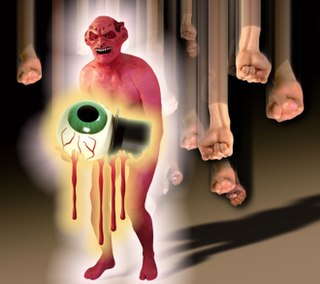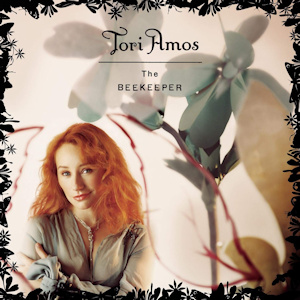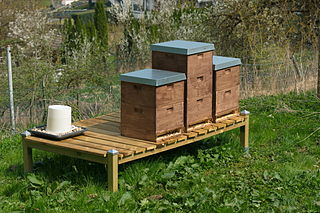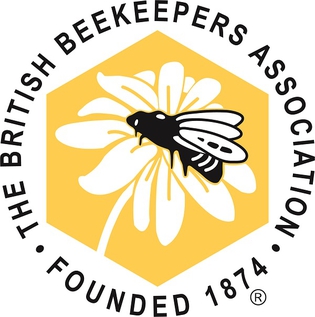See also
- Beekeeping
- The Beekeeper's Apprentice , a novel by Laurie R. King
The Beekeeper may refer to:

The Africanized bee, also known as the Africanized honey bee and colloquially as the "killer bee", is a hybrid of the western honey bee, produced originally by crossbreeding of the East African lowland honey bee (A. m. scutellata) with various European honey bee subspecies such as the Italian honey bee (A. m. ligustica) and the Iberian honey bee (A. m. iberiensis).

A beehive is an enclosed structure in which some honey bee species of the subgenus Apis live and raise their young. Though the word beehive is used to describe the nest of any bee colony, scientific and professional literature distinguishes nest from hive. Nest is used to discuss colonies that house themselves in natural or artificial cavities or are hanging and exposed. The term hive is used to describe an artificial/man-made structure to house a honey bee nest. Several species of Apis live in colonies. But for honey production, the western honey bee and the eastern honey bee are the main species kept in hives.

A beekeeper is a person who keeps honey bees, a profession known as beekeeping.

Beekeeping is the maintenance of bee colonies, commonly in man-made beehives. Honey bees in the genus Apis are the most commonly kept species but other honey producing bees such as Melipona stingless bees are also kept. Beekeepers keep bees to collect honey and other products of the hive: beeswax, propolis, bee pollen, and royal jelly. Other sources of beekeeping income include pollination of crops, raising queens, and production of package bees for sale. Bee hives are kept in an apiary or "bee yard".

An apiary is a location where beehives of honey bees are kept. Apiaries come in many sizes and can be rural or urban depending on the honey production operation. Furthermore, an apiary may refer to a hobbyist's hives or those used for commercial or educational usage. It can also be a wall-less, roofed structure, similar to a gazebo which houses hives, or an enclosed structure with an opening that directs the flight path of the bees.

A queen bee is typically an adult, mated female (gyne) that lives in a colony or hive of honey bees. With fully developed reproductive organs, the queen is usually the mother of most, if not all, of the bees in the beehive. Queens are developed from larvae selected by worker bees and specially fed in order to become sexually mature. There is normally only one adult, mated queen in a hive, in which case the bees will usually follow and fiercely protect her.

Demons Dance Alone is a 2002 concept album by American art rock group the Residents about the emotional effects of the September 11, 2001 attacks. The album is split into three main parts, "Loss", "Denial", and "The Three Metaphors", bookended by "Tongue" and "Demons Dance Alone", and broken up by various untitled transitional instrumentals.
Toast most commonly refers to:

The Beekeeper is the eighth studio album by American musician Tori Amos. It was released on February 20, 2005, through Epic Records and is her second release for the label. As with many of Amos' releases throughout the 2000s, The Beekeeper is a concept album, heavily inspired by the practice of beekeeping and its connection to femininity and female empowerment. The album's nineteen tracks are separated into six different "gardens", and are inspired by topics such as her experiences with motherhood, betrayal ("Witness"), and Christian mythology.

In modern American beekeeping, a Langstroth hive is any vertically modular beehive that has the key features of vertically hung frames, a bottom board with entrance for the bees, boxes containing frames for brood and honey and an inner cover and top cap to provide weather protection. In a Langstroth hive, the bees build honeycomb into frames, which can be moved with ease. The frames are designed to prevent bees from attaching honeycombs where they would either connect adjacent frames, or connect frames to the walls of the hive. The movable frames allow the beekeeper to manage the bees in a way which was formerly impossible.

A honey extractor is a mechanical device used in the extraction of honey from honeycombs. A honey extractor extracts the honey from the honey comb without destroying the comb. Extractors work by centrifugal force. A drum or container holds a frame basket which spins, flinging the honey out. With this method the wax comb stays intact within the frame and can be reused by the bees.

Melittology is a branch of entomology concerning the scientific study of bees. It may also be called apiology or apicology. Melittology covers the species found in the clade Anthophila within the superfamily Apoidea, comprising more than 20,000 species, including bumblebees and honey bees.

The western honey bee or European honey bee is the most common of the 7–12 species of honey bees worldwide. The genus name Apis is Latin for "bee", and mellifera is the Latin for "honey-bearing" or "honey carrying", referring to the species' production of honey.

Commercial Beekeeping in the United States dates back to the 1860s.

Beekeeping in New Zealand is reported to have commenced in 1839 with the importing of two skep hives by Mary Bumby, a missionary. It has since become an established industry as well a hobby activity.

Colony collapse disorder (CCD) is an abnormal phenomenon that occurs when the majority of worker bees in a honey bee colony disappear, leaving behind a queen, plenty of food, and a few nurse bees to care for the remaining immature bees. While such disappearances have occurred sporadically throughout the history of apiculture, and have been known by various names, the syndrome was renamed colony collapse disorder in early 2007 in conjunction with a drastic rise in reports of disappearances of western honey bee colonies in North America. Beekeepers in most European countries had observed a similar phenomenon since 1998, especially in Southern and Western Europe; the Northern Ireland Assembly received reports of a decline greater than 50%. The phenomenon became more global when it affected some Asian and African countries as well.
Beekeeping is first recorded in Ireland in the seventh century. It has seen a surge in popularity in modern times, with the membership of beekeeping associations exceeding 4,500. The median average number of hives per beekeeper is three hives, while the average honey output per hive is 11.4 kg. The growth in the practice has occurred despite increased pressures on bees and beekeepers due to parasites, diseases and habitat loss.
Beekeeping in the United Kingdom is the maintenance of bee colonies by humans within the United Kingdom. It is a significant commercial activity that provides those involved with honey, beeswax, royal jelly, queen bees, propolis, flower pollen and bee pollen. Honeybees also provide pollination services to orchards and a variety of seed crops.

Beezy Bear is a 1955 Disney animated short featuring Donald Duck, who appears as a beekeeper. This is Humphrey the Bear's fifth appearance. The cartoon portrays Humphrey as a honey-stealing bear.

The British Beekeepers Association (BBKA) is a charitable organisation registered in England and Wales that was founded in 1874. It is made up of 75 associations in England & Wales plus one in Northern Ireland, Isle of Man and Jersey. At end of 2018 there were 26,555 members. Its patrons include the Worshipful Company of Wax Chandlers and Jimmy Doherty.